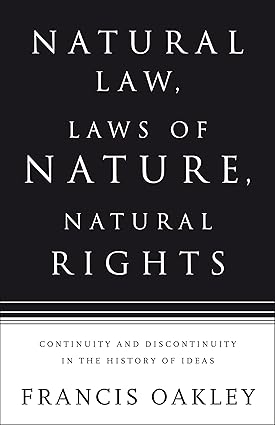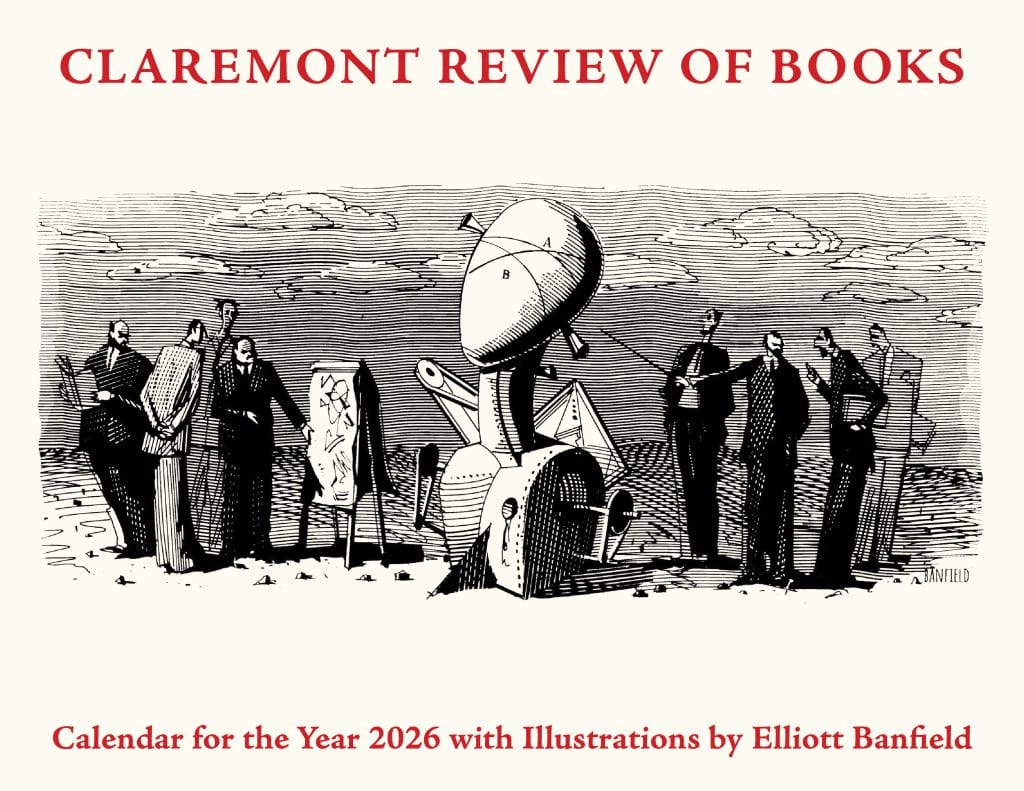Books Reviewed
Francis Oakley is an eminent scholar of medieval political thought, and his Natural Law, Laws of Nature, Natural Rights is a short but synoptic presentation of many of his leading themes. The book is elegant yet accessible, only occasionally heavy with scholarship. Focusing on the “continuities” and “discontinuities” in the intellectual history of natural law and related topics, Oakley emphatically wants to distinguish his “history of ideas” from more speculative or philosophical approaches. His main animus is directed against the work of Leo Strauss and his students, although he disagrees with other accounts, too, such as Michael Foucault’s or Michel Villey’s, that argue for large theoretical breaks or disruptions in this history.
As is well known, Strauss had an “epic” account (John Gunnell’s phrase) of the history of political philosophy, with a break amounting to a chasm separating ancients and moderns. Medievals of various sorts were treated as belonging in the ancient camp, so long as they could be considered to be doing political philosophy. According to Strauss, after the break between ancients and moderns begun by Machiavelli, Thomas Hobbes took the Machiavellian intellectual reorientation and applied it to the natural law tradition, a tradition that the Florentine had apparently considered so removed from the “effectual truth” of politics as not to warrant much systematic attention. With Hobbes and his later followers like John Locke, traditional natural law was replaced by a modern doctrine of natural rights.
Oakley, who is the Edward Dorr Griffin Professor of the History of Ideas, Emeritus, and President Emeritus at Williams College, wants to tell a different story, a story that contains much more continuity than Strauss’s. As Oakley has it, there was not one but two pre-modern natural law traditions, one metaphysically realist, following Thomas Aquinas; and the other metaphysically nominalist, taking its bearings from William of Ockham. The concept of rights in the sense of subjective rights, rights different from duties, emerged from the Ockhamist tradition. This much is familiar from Oakley’s earlier work. In this volume, he modifies the story a bit by incorporating the findings of Brian Tierney and others who have discovered that subjective rights emerged in the 12th-century canon law commentators, thus predating Ockham. Oakley disagrees then with Strauss that a major break in intellectual history occurred in the 17th century. So far as there was a break, it occurred much earlier, and was apparently much less serious. What’s more, the earlier tradition continued beyond the point that Strauss had thought. One result of Oakley’s alternative storyline is that medieval Christian thought, his focus, looms much larger than it did for Strauss, who, as has often been noted, wrote very little on the subject.
And yet the author is wary of endorsing the strong continuity thesis affirmed by some historians in reaction against big-break theses like Strauss’s. Such historians, writes Oakley, “miss the significant differences of emphasis and nuance that serve to distinguish modern and even early modern patterns of thinking from what has gone before.” The earlier medieval ideas “survived” and left “their imprint on the great social contract theorists of the seventeenth and eighteenth centuries. But it must be insisted that [they] did not do so without undergoing in the post-medieval period a significant and crucial transition.” And so, on almost the last page, he concludes that
perhaps we should hesitate to brush to the side the stubborn convictions of so many modern commentators that there really was something novel about the particular type of discourse concerning the subjective natural rights of individuals that began to come to center stage in the political thinking of the seventeenth century.
So, was there a significant break in the 17th century, or wasn’t there?
At the end of the day (or the book) Oakley can’t really say. Everything he does is admittedly “sub-philosophical” and so all he can conclude is that there was some continuity and some discontinuity. His sub-philosophical treatment even stands in the way of formulating clearly just what the issues and the stakes are in the debates into which he injects himself. Strauss’s claim was not that the concept of “subjective right” was unknown prior to Hobbes. It’s true that Strauss said little about the Ockhamist tradition and made no effort to trace the history of the concept of subjective right. But Oakley has not shown that any of this makes a difference, and indeed in his closing thoughts suggests that perhaps Strauss was correct all along.
As a somewhat heterodox Straussian, I believe we can go even farther than Oakley or Tierney has, and can find subjective rights in ancient sources like the Roman Law texts. For Strauss, more than the concept of subjective right was required to constitute the modernist break with the tradition. There must be a clear affirmation of natural subjective right, right inhering in individuals independent of positive law and legal rights. Thus the new notion of right tends to accompany the notion of a state of nature, as Oakley in his last pages concedes. Still, Oakley never comes close to grasping why Hobbes’s right of nature is so extraordinary: it is pure liberty without a correlative duty. Earlier subjective-rights thinkers did not conceive rights in this way. Finally, the entire political realm must be construed in terms of, and for the sake of, this kind of right—again a claim not present in earlier thought. Only when we put together this whole package, along with the underlying philosophic rationale for it, do we have what Strauss called modern natural right philosophy.
Francis Oakley’s historical works, including Natural Law, Laws of Nature, Natural Rights, though impressive in scope and learning, consistently fall short of what the subject matter requires. And I have to say that his smug sense of superiority to Strauss is altogether undeserved.






